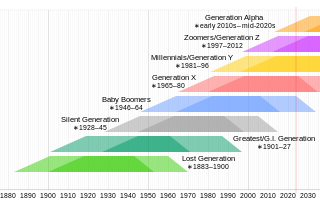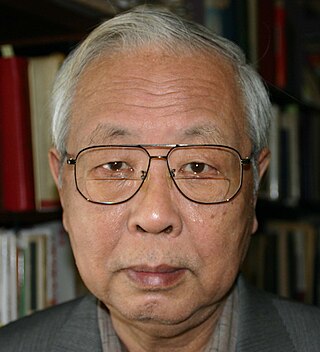
The 20th (twentieth) century began on January 1, 1901 (MCMI), and ended on December 31, 2000 (MM). The 20th century was dominated by significant events that defined the modern era: sixth mass extinction, Spanish flu pandemic, World War I and World War II, nuclear weapons, nuclear power and space exploration, nationalism and decolonization, the Cold War and post-Cold War conflicts, and technological advances. These reshaped the political and social structure of the globe.

The Greatest Generation, also known as the G.I. Generation and the World War II generation, is the Western demographic cohort following the Lost Generation and preceding the Silent Generation. The generation is generally defined as people born from 1901 to 1927. They were shaped by the Great Depression and were the primary generation composing the enlisted forces in World War II.
Neocolonialism is the continuation or reimposition of imperialist rule by a state over another nominally independent state. Neocolonialism takes the form of economic imperialism, globalization, cultural imperialism and conditional aid to influence or control a developing country instead of the previous colonial methods of direct military control or indirect political control (hegemony).
Diplomatic history deals with the history of international relations between states. Diplomatic history can be different from international relations in that the former can concern itself with the foreign policy of one state while the latter deals with relations between two or more states. Diplomatic history tends to be more concerned with the history of diplomacy, but international relations concern more with current events and creating a model intended to shed explanatory light on international politics.

In the history of the United States, the period from 1918 through 1945 covers the post-World War I era, the Great Depression, and World War II. After World War I, the U.S. rejected the Treaty of Versailles and did not join the League of Nations.

A great power is a sovereign state that is recognized as having the ability and expertise to exert its influence on a global scale. Great powers characteristically possess military and economic strength, as well as diplomatic and soft power influence, which may cause middle or small powers to consider the great powers' opinions before taking actions of their own. International relations theorists have posited that great power status can be characterized into power capabilities, spatial aspects, and status dimensions.

Niall Campbell FergusonFRSE is a Scottish-American historian based in the United States who is the Milbank Family Senior Fellow at the Hoover Institution at Stanford University and a senior fellow at the Belfer Center for Science and International Affairs at Harvard University. Previously, he was a professor at Harvard University, the London School of Economics, New York University, a visiting professor at the New College of the Humanities, and a senior research fellow at Jesus College, Oxford, England.

Paul Bede Johnson was an English journalist, popular historian, speechwriter, and author. Although associated with the political left in his early career, he became a popular conservative historian.

George Weigel is a Catholic neoconservative American author, political analyst, and social activist. He currently serves as a Distinguished Senior Fellow of the Ethics and Public Policy Center. Weigel was the Founding President of the James Madison Foundation. He is the author of a best-selling biography of Pope John Paul II, Witness to Hope, and Tranquillitas Ordinis: The Present Failure and Future Promise of American Catholic Thought on War and Peace.
A universal history is a work aiming at the presentation of a history of all of mankind as a whole, coherent unit. A universal chronicle or world chronicle typically traces history from the beginning of written information about the past up to the present. Therefore, any work classed as such purportedly attempts to embrace the events of all times and nations in so far as scientific treatment of them is possible.

Social cycle theories are among the earliest social theories in sociology. Unlike the theory of social evolutionism, which views the evolution of society and human history as progressing in some new, unique direction(s), sociological cycle theory argues that events and stages of society and history generally repeat themselves in cycles. Such a theory does not necessarily imply that there cannot be any social progress. In the early theory of Sima Qian and the more recent theories of long-term ("secular") political-demographic cycles as well as in the Varnic theory of P.R. Sarkar an explicit accounting is made of social progress.

Ian Johnson is a Canadian-born American writer and independent scholar known for his long-time reporting and a series of books on China and Germany. His Chinese name is Zhang Yan (張彦). Johnson writes regularly for The New York Review of Books and The New York Times, and speaks in Europe and North America.

The Shape of Things to Come is a work of science fiction by British writer H. G. Wells, published in 1933. It takes the form of a future history which ends in 2106.
The term modern period or modern era is the period of history that succeeds the Middle Ages. This terminology is a historical periodization that is applied primarily to European and Western history.
Modern liberalism in the United States, often simply referred to in the United States as liberalism, is a form of social liberalism found in American politics. It combines ideas of civil liberty and equality with support for social justice and a well-regulated mixed economy. Modern liberalism generally opposes the interests of corporations, opposes cuts to the social safety net, and supports a role for government in reducing inequality, increasing diversity through contemporary means, providing education, ensuring access to healthcare, regulating economic activity, and protecting the natural environment. This form of liberalism took shape in the 20th century United States as the voting franchise and other civil rights were extended to a larger class of citizens, most notably among African Americans and women. Major examples of modern liberal policy programs include the New Deal, the Fair Deal, the New Frontier, the Great Society, and the Affordable Care Act.
Liberalism in the United States is a political and moral philosophy based on concepts of unalienable rights of the individual. The fundamental liberal ideals of freedom of speech, freedom of the press, freedom of religion, the separation of church and state, the right to due process and equality under the law are widely accepted as a common foundation of liberalism. It differs from liberalism worldwide because the United States has never had a resident hereditary aristocracy and avoided much of the class warfare that characterized Europe. According to Ian Adams: "Ideologically, all US parties are liberal and always have been. Essentially they espouse classical liberalism, that is a form of democratised Whig constitutionalism plus the free market. The point of difference comes with the influence of social liberalism" and the proper role of government.

Ikuhiko Hata is a Japanese historian. He earned his PhD at the University of Tokyo and has taught history at several universities. He is the author of a number of influential and well-received scholarly works, particularly on topics related to Japan's role in the Second Sino-Japanese War and World War II.
In many periodizations of human history, the late modern period followed the early modern period. It began approximately around the year 1800 and depending on the author either ended with the beginning of contemporary history after World War II, or includes that period up to the present day. Notable historical events in the late 18th century that marked the transition from the early modern period to the late modern period include the American Revolution (1765–1791), the French Revolution (1789–1799), and the beginning of the Industrial Revolution around 1760. It took all of human history up to 1804 for the world's population to reach 1 billion; the next billion came just over a century later, in 1927.

The Origins of Political Order: From Prehuman times to the French Revolution is a 2011 book by political economist Francis Fukuyama. The main thesis of the book covers three main components that gives rise to a stable political order in a state: the state needs to be modern and strong, to obey the rule of law governing the state and be accountable. This theory is argued by applying comparative political history to develop a theory of the stability of a political system. The book covers several regions, and uses case studies of political developments from these regions, the scope is wide and consists of ancient history to the early modern period. Fukuyama refers to Amartya Sen's view that democracy remains the default political condition. Though not universally accepted as a form of government, even autocratic leaders have maintained semblance of democracy for legitimisation of their rule and use of media for their projection as democratic leaders. However, the situation in Iraq and Afghanistan challenges the assumption as there is no default reset to democracy once the sitting governments or leaders are removed.












